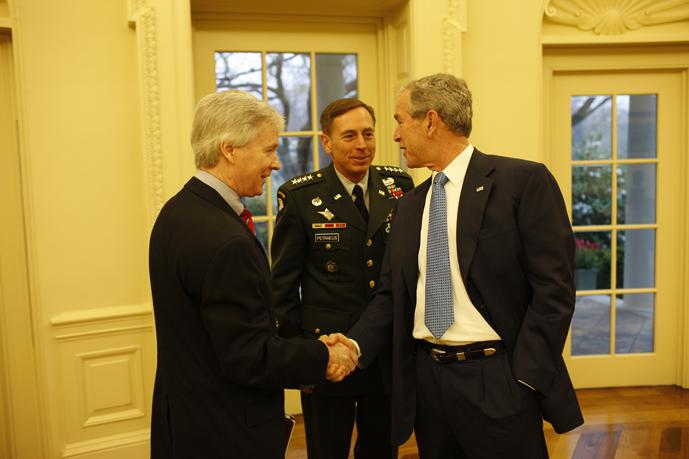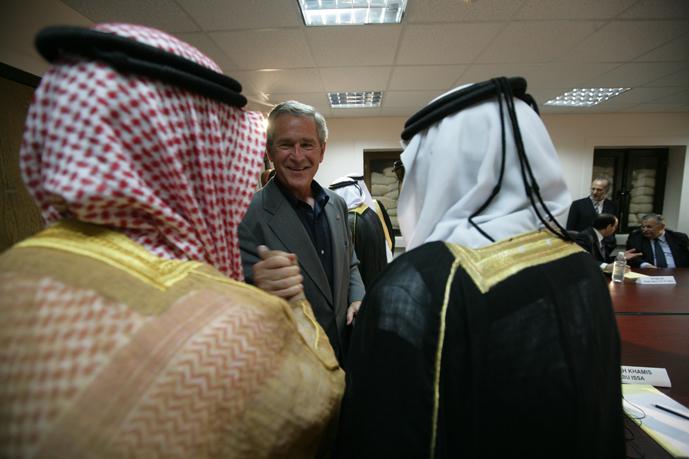2006. He came across as a patient, unassuming diplomat. But beneath his calm exterior was a fearless man widely regarded as the best Foreign Service officer of his generation. Fluent in Arabic, Ryan had served all over the Middle East, including several tours in Iraq. He had survived the 1983 terrorist attack on our embassy in Lebanon and escaped an angry mob plundering his residence in Syria. When I announced the new strategy in Iraq, I decided we should change ambassadors, too. I nominated Zal Khalilzad, who had done a fine job in Baghdad, to be our permanent representative to the UN. Condi didn’t take long to recommend a replacement for him. She said Ryan was the only man for the job.
Ryan gained my respect quickly. He had a knack for detecting problems and heading them off. He spoke bluntly about challenges but had a wry sense of humor and liked to laugh. “What have you got for me today, Sunshine?” I asked him during one particularly rough stretch. He started his briefing with a big grin. He worked seamlessly with General Petraeus. And he earned the trust of Iraqis from all factions.
The heart of the civilian surge was doubling the number of Provincial Reconstruction Teams, which paired civilian experts with military personnel. I held several videoconferences and meetings with PRT team leaders deployed across Iraq. They were an impressive group. Several were grizzled combat veterans. Another was a female Foreign Service officer whose son served as a Marine in Iraq. They described their projects, which ranged from supporting a local newspaper in Baghdad to helping set up courts in Ninewa to creating a soil-testing laboratory to improve agriculture in Diyala. It wasn’t always glamorous work, but it was critical to the counterinsurgency strategy we were carrying out.
I spoke to General Petraeus and Ambassador Crocker by secure video-conference at least once a week, sometimes more often. I believed a close personal relationship and frequent contact were critical to making the new strategy succeed. The conversations gave me a chance to hear firsthand reports on conditions in Iraq. They allowed Petraeus and Crocker to share frustrations and push for decisions directly from the commander in chief.

With David Petraeus (
The situation was improving, but we all worried about the possibility of another Samarra-like bombing, a game-changer that would reignite sectarian violence. Petraeus pinpointed another problem. “The Washington clock is ticking a lot faster than the Baghdad clock,” he said.
He was right. Less than one week after General Petraeus arrived in Iraq, the new Democratic majority in the House of Representatives had passed a nonbinding resolution that declared, “Congress disapproves of the decision of President George W. Bush announced on January 10, 2007, to deploy more than 20,000 additional United States combat troops to Iraq.”
After a day of heavy violence in April, Senator Harry Reid of Nevada declared, “This war is lost, the surge is not accomplishing anything.” The majority leader of the U.S. Senate had just used his platform to tell 145,000 American troops and their families that they were fighting for a lost cause. He had written off the surge as a failure before all of the additional troops had even arrived. It was one of the most irresponsible acts I witnessed in my eight years in Washington.
On May 1, Congress sent me a war-funding bill mandating a troop withdrawal deadline later in the year. Setting an arbitrary pullout date would allow our enemies to wait us out and would undermine our ability to win over the local leaders who were critical to our success. I vetoed the bill. Led by Senate Minority Leader Mitch McConnell—who supported the surge after I announced it and graciously later admitted to me that he had been wrong to suggest a withdrawal—and House Minority Leader John Boehner, Republicans on Capitol Hill stood firm. Democrats didn’t have the votes to override the veto. On May 25, I signed a bill fully funding our troops with no timetable for withdrawal.

They called it “The Awakening.”
Anbar is Iraq’s largest province, a sprawling expanse of desert that extends from the western boundary of Baghdad to the borders of Syria, Jordan, and Saudi Arabia. At fifty-three thousand square miles, Anbar covers nearly the same amount of land as New York State. Its population is mostly Sunni. For almost four years, it served as a stronghold for insurgents—and a sanctuary for al Qaeda.
Al Qaeda took over Anbar’s principal cities, infiltrated the security forces, and imposed their ideology on the population. Like the Taliban, they forbade women from leaving their homes without a male escort and banned sports and other leisure activities. They attacked American troops, Iraqi security forces, and anyone else who resisted them. By 2006, Anbar was home to an average of forty-one attacks per day.
Our troops discovered an al Qaeda document laying out an elaborate governing structure for Anbar, including an Education Department, a Social Services Department, and an “Execution Unit.” Our intelligence community believed Anbar was to be al Qaeda’s base for planning attacks on the United States. In August 2006, a senior Marine Corps intelligence officer in Anbar wrote a widely publicized report concluding that the province was lost.
Then everything changed. The people of Anbar had a look at life under al Qaeda, and they didn’t like what they saw. Starting in mid-2006, tribal sheikhs banded together to take their province back from the extremists. The Awakening drew thousands of recruits.
As part of the surge, we deployed four thousand additional Marines to Anbar, where they reinforced the tribal sheikhs and boosted their confidence. Many of the al Qaeda jihadists fled into the desert. Violence in the province plummeted by more than 90 percent. Within months, the brave people of Anbar—with support from our troops—had retaken their province. An al Qaeda safe haven had become the site of its greatest ideological defeat.
On Labor Day 2007, I made a surprise visit to Anbar. Air Force One flew over what looked like a giant sand dune and touched down at Al Asad Air Base, a patch of black asphalt amid miles of brown. We walked down the stairs into the searing heat and quickly moved to an air-conditioned room at the base. I listened to several briefings and then met with a group of tribal sheikhs who had started the Anbar uprising. They were a rough-hewn, earthy bunch. Their friendly, animated mannerisms reminded me of local officials in West Texas. But instead of jeans and boots, they were wearing full-length robes and colorful headdresses.

With the Anbar sheikhs who rallied their tribes against al Qaeda.
The sheikhs beamed with pride as they described what they had accomplished. Violence was down dramatically; mayors’ offices and city councils were functioning; judges were hearing cases and meting out justice. With the help of our civilian surge, the provincial council in Ramadi had reopened, with thirty-five members present for the inaugural session.
Prime Minister Maliki and President Jalal Talabani joined the meeting. It was extraordinary to watch Maliki, a Shia; Talabani, a Kurd; and a roomful of Sunni sheikhs discuss the future of their country. When the prime minister asked what they needed, they had a long list of requests: more money, more equipment, and more infrastructure. Maliki complained that there wasn’t enough in the budget for everything they asked for. Talabani helped referee the disputes. I sat back and enjoyed the scene. Democracy was at work in Iraq.
I thanked the sheikhs for their hospitality and their bravery in the war on terror. “If you need us,” one sheikh jubilantly told me, “my men and I will go to Afghanistan!”

Washington was abuzz when Petraeus and Crocker arrived on September 10 to testify before Congress and make recommendations on the way forward in Iraq. For months, Democrats had pledged to use their testimony to cut off funding for the war. In July, the
The morning of the hearings, the left-wing group MoveOn.org ran a full-page newspaper ad that read, “General Petraeus or General Betray Us? Cooking the Books for the White House.” It was an astonishing character attack on a four-star general. It was also a political mistake. Democrats in Congress tried to avoid endorsing the ad while supporting the antiwar sentiment behind it. One New York senator denounced the ad but said Petraeus’s

